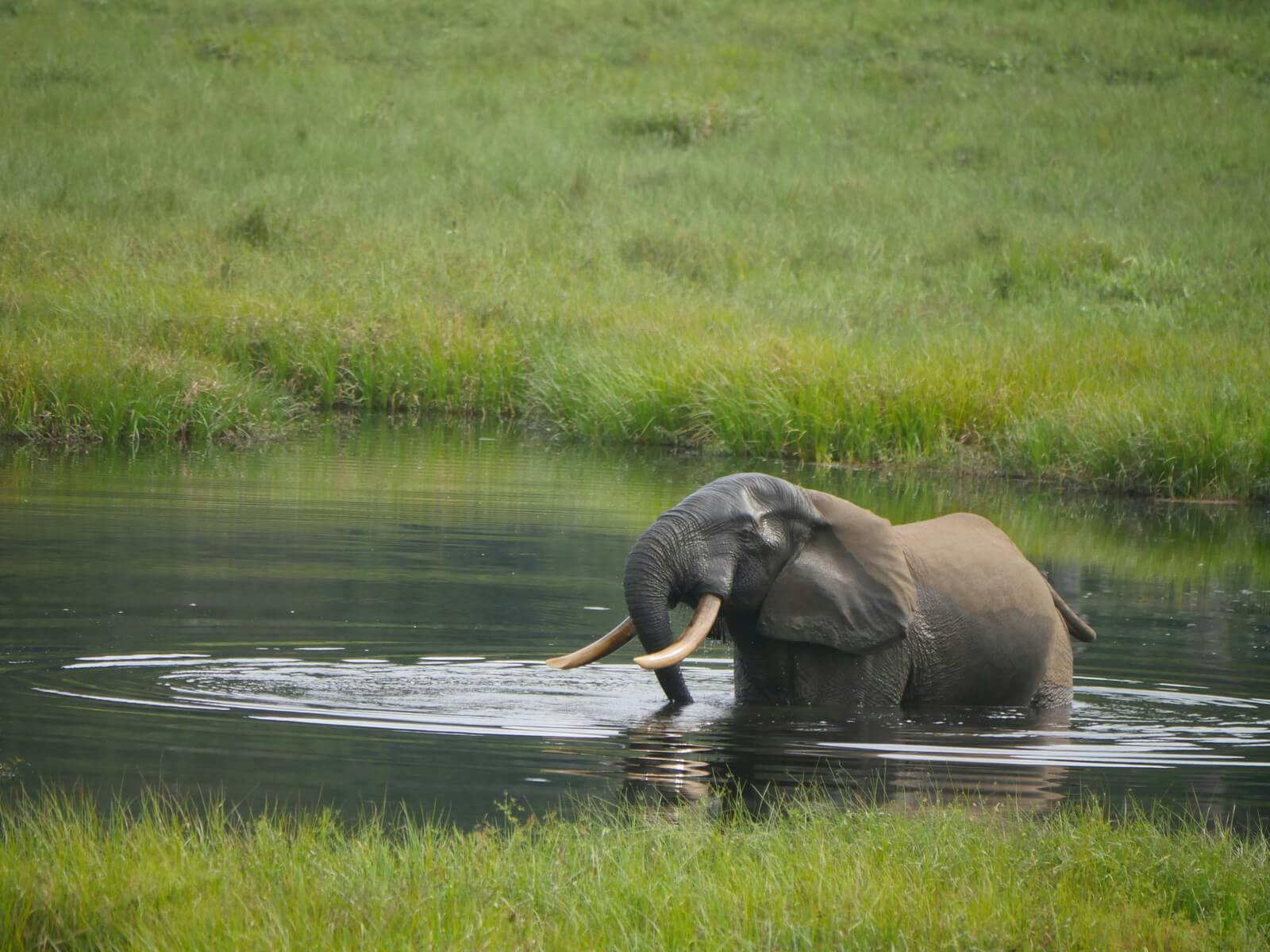- Local human rights and other NGOs are calling for the cancellation of a February 8, 2024 oil permit that greenlit oil exploration in Conkouati-Douli National Park, the most biodiverse protected area in the Republic of Congo. The park hosts key endangered wildlife species, including Western lowland gorillas, chimpanzees, and forest elephants, and is home to approximately 7,000 people in some thirty villages whose livelihoods depend on the forest.
- Oil development there would be a disaster for human and economic rights, the environment, and governance. The Park’s major donors include the Agence Française de Développement (AFD) and the EU.
- New maps and technical analysis by Earth Insight — with contributions from Greenpeace Africa and released ahead of World Rainforest Day — show the Conkouati oil exploration permit overlaps 18% of Conkouati-Douli National Park and over 1,000 km2 of undisturbed tropical forest.
June 22, 2024, Kinshasa — Just two months after signing a $50 million forest protection deal with donors at COP 28, the Republic of Congo awarded an oil and gas exploration permit to a little-known Chinese company in Conkouati-Douli National Park, the country’s most biodiverse protected area. New maps and analysis show the permit poses substantial risk to tropical forests, endangered species, and the local communities that have lived in the zone for centuries.
Earth Insight’s newly-released research shows that, together with the Conkouati block, numerous other unawarded oil and gas blocks overlap over half the park.
Download the maps and read the technical insight.
The previously unexplored and unlicensed Conkouati block is home to approximately 7,000 people. In a major report this month, Amnesty International highlighted the human cost of oil spills by two multinational oil companies drilling Congo’s onshore coastal blocks. Similar oil spills in Conkouati-Douli National Park would be almost certain to result in catastrophic consequences for local people as well as biodiversity.
Earth Insight joins thirteen Congolese NGOs in calling on donors to suspend conservation financing of the Park until the oil and gas permit is canceled.
Conkouati-Douli National Park protects over 8,000 km2 of coastal, marine, and forest ecosystems where Congo’s tropical rainforest meets the Atlantic ocean. The park, which also includes a Ramsar site (a wetland zone of international importance under the Ramsar Convention), is home to key endangered wildlife species, including the Western lowland gorilla, the chimpanzee, the leatherback turtle, and the forest elephant.
Established in 1999 by Presidential decree, the park was co-managed by Wildlife Conservation Society and the government until 2018. In April 2021 Noé, a French conservation NGO, signed a partnership agreement and assumed the daily operational management of the National Park. Together with the Mayumba National Park in Gabon, the park forms the Mayumba-Conkouati Transfrontier Landscape.
The 1999 decree states that exploration and exploitation permits can only be granted within areas designated as “eco-development zones,” and that extractive activities are also prohibited within a 5 km buffer zone on its southern and eastern borders.
Unless it’s reversed, the decision last February to open the Conkouati oil block for exploration will have significant consequences for the conservation and landscape integrity of the block and the park as a whole.
Maps and research
Download maps for this story here (English and French).
Read the Technical Insight here.
Quotes and Interview opportunities
“Our ask is simple: that the Congolese government honor its commitments to the protection of forests and the people who live in them by canceling the Conkouati block. The forests of the Congo Basin are vital not only for the survival of forest communities but also for the African continent as a whole. Responding to the challenge of global climate change will require strong African leadership.”
Murtala Touray, Program Director, Greenpeace Africa, murtala.touray@greenpeace.org
“We protect these places first and foremost because we protect our people. Biodiversity isn’t plants and animals for tourism, export, or storing carbon: biodiversity is our clean air, our clean water, our food, our medicine and our shared future. The government of the Republic of Congo must reverse its decision. Protecting Conkouati-Douli is an important test of African governments’ and donor countries’ resolve to protect our forests.”
Stella Tchoukep, Forest Campaigner at Greenpeace Africa
“The decision to permit the Conkouati block for oil exploration is a direct threat to tropical forests and biodiversity that the Republic of Congo government and the international donor and conservation community have committed to protect. By opening Conkouati-Douli National Park to extractives, critical landscapes risk being degraded and fragmented, endangering the ecosystem services they provide and the local livelihoods that rely on them.”
Anna Bebbington, Senior Spatial Analyst Earth Insight, anna@earth-insight.org
“On World Rainforest Day, a closer look at the situation in Conkouati-Douli National Park illustrates a huge global problem — namely that oil and gas and industrial expansion continues to open up and fragment critical ecosystems. Simply put, we need to ensure the protection of protected areas and intact ecosystems globally while also finding ways to advance regenerative economic development.”
Tyson Miller, Executive Director, Earth Insight, tyson@earth-insight.org
About Earth Insight
Earth Insight maps and analyzes fossil fuel and extractive industry concessions in key ecosystems to spotlight urgent future threats before they happen.
A global climate communications initiative, Earth Insight is uniquely positioned in the science, policy, and media sectors to advance protection of critical ecosystems and climate stability, and to bolster Indigenous calls for expanded rights and territories. The development of science-grounded research and advocacy tools arms communities and the environmental movement to apply political and financial pressure to stop industrial expansion. Our work creates urgency and clarity to accelerate policy interventions in support of nature and climate agendas.


